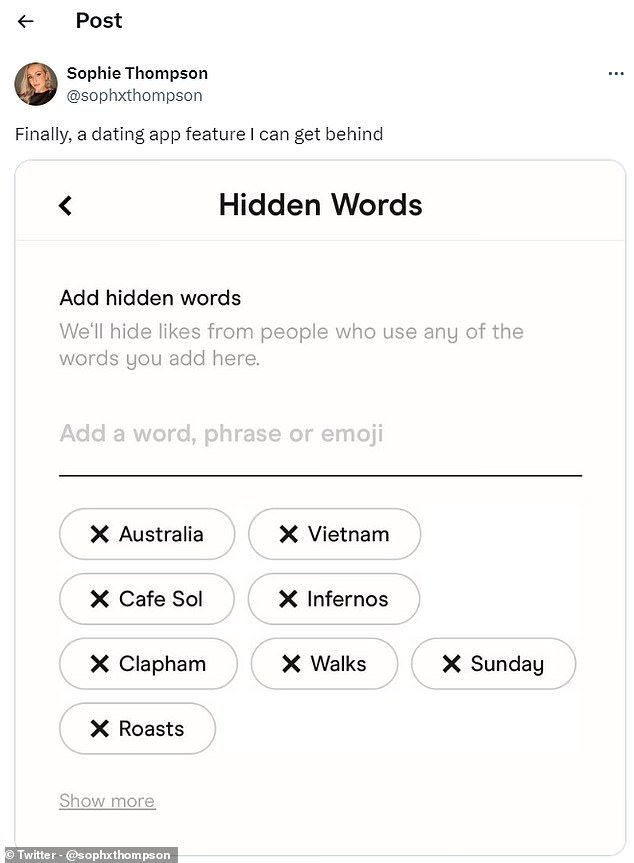‘Finally, a dating app feature I can get behind!’ Singletons love Hinge’s huge update which lets them automatically filter out time-wasters and creeps
With thousands of potential matches, opening a dating app can feel like wading through a sea of spam and unwanted text messages.
But now Hinge has made it easier than ever to avoid wasted time and toxicity by letting users filter out unwanted terms.
The new Hidden Words tool automatically blocks ‘Likes with comments’ that contain words, phrases or even emojis as chosen by the users.
And from ‘Sunday Roast’ to ‘F1’, Hinge users have taken to social media to share the phrases and dating clichés they’re tired of hearing.
One
Hinge has launched a new ‘Hidden Words’ feature that allows users to filter a selection of words, phrases and emojis
On Hinge, instead of just liking the entire profile, users can also like a specific part, such as an image or prompt, and choose to add a comment for the other user to read.
The new feature, released this week, gives users the ability to create a list of ‘Hidden Words’.
Every time a user receives a Like with a comment that contains one of these words, that message is filtered into a separate folder.
This means that unwanted messages are not added to your total number of likes, but are stored in a ‘Hidden Likes folder’.
From there, the messages can be viewed or deleted individually without ever being opened.
Users who are filtered out are not automatically blocked or reported, but you can choose to do so after reading their comments.
To set your own list of hidden words, simply navigate to the Settings tab in the Hinge app.
Under ‘Safety’, select ‘Hidden words’ to view your own list and add terms you’d rather not hear about.
Additionally, users can add messages to their hidden words list if they report messages as inappropriate.
On X, Hinge users have welcomed the new feature, with one commenter writes: ‘This new Hinge hidden words feature is a life saver.’
another added, “The new Hidden Words feature on Hinge is the best thing they’ve ever done.”
While another said they were “gutted, this didn’t exist when I used Hinge.”

On social media, X users welcomed the new feature, with some saying this was finally ‘a dating app feature I can get behind’

To add your own list of blocked words, go to Settings and select ‘Hidden words’ under the security settings

Some called the feature a “life saver” and shared screenshots of the words they wouldn’t want to hear anymore about
A few X users even shared their own lists of hidden words, giving a hint at what singletons on Hinge are tired of hearing about.
And it’s bad news for Sunday walk and roast lovers, as these terms topped the list of hidden words for some.
Anyone talking about ‘F1’, ‘Banter’, ‘Pizza’ and even ‘Clapham’ may also find themselves filtered out by many with this new feature.
One commenter posted a screenshot of their hidden words and shared “the only way to use the hidden words feature” while filtering out the term “Pineapple on pizza.”

Some Hinge users shared their feelings that words like ‘Sunday Roast’, ‘F1’ and ‘Banter’ would be on their hidden words list

Screenshots of users’ Hidden Words lists provide unique insight into the topics Hinge users hear about all too often
However, Hinge says this new feature isn’t just about avoiding conversation topics you find boring.
Instead, the Hidden Words option is designed to “help sidestep a negative interaction before it starts.”
Research has previously suggested that online abuse, including on dating apps, is increasing.
A 2021 survey from the Pew Research Center found that four in 10 Americans experienced online harassment.
The problem is especially prevalent among women who are more likely to experience sexual harassment, and among LGBTQ dating app users who are more likely to experience abuse.
In light of this increase, other dating apps have also taken steps to reduce unwanted interactions.
Notably, Tinder has recently taken steps to improve its verification procedures to tackle ‘catfishing’ and bots.

One user even joked that “the only way to use the hidden words feature” is to block any mention of “Pineapple on pizza.”

While social media users joked about avoiding nasty terms, Hinge says the new feature is designed to reduce abuse and unwanted interactions
Jeff Dunn, Hinge’s vice president of trust and safety, says, “This feature is about empowering daters to define their boundaries, increasing their confidence in the process.
“Our hope is that with Hidden Words, users will feel reassured that they can explore potential connections in a way that is most comfortable for them, leading to safer and more satisfying dating experiences.”
While Hinge claims this is the first time a dating app has offered this feature, it isn’t the first company to offer selective filtering for its users.
Instagram first allowed users to filter offensive terms from posts in 2016, before expanding the option to direct messages.
After Hinge made their announcement, Meta also added their own ‘Hidden Words’ feature to Threads, allowing users to mute words, phrases, and emojis.
This feature applies to your “Follow” and “For You” feeds, as well as your search results, replies, and profile searches.
In addition, Threads is experimenting with options to control who can quote your post and give users the ability to ‘de-quote’ their own posts.
Like Hinge, Meta claims that these features aim to reduce the amount of unwanted interactions.
